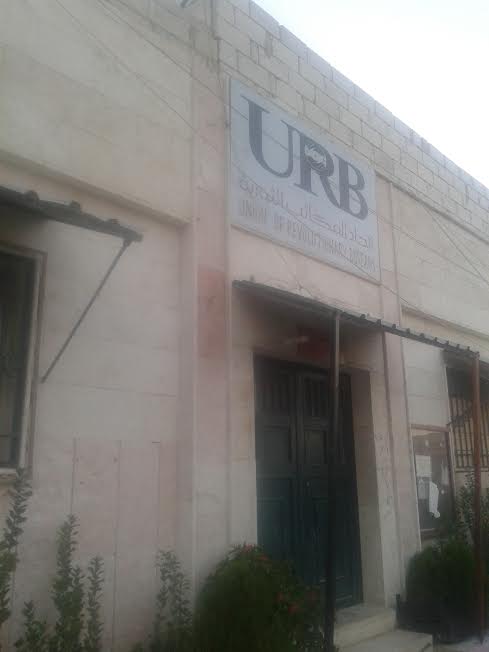Job Opportunities in War-Torn Syria

Mansur felt helpless. Like thousands of other Syrians, he had lost his job and was struggling to meet the growing needs of his wife and children.
Refusing to give up, the 45-year-old searched for new employment. When he heard of the Union of Revolutionary Bureaus (URB) in Kfar Nabel, he decided to approach it. He met its director, Raed al-Fares, who offered him an administrative job for a steady 100 US dollars a month.
Mansur’s new job was at a URB division overseeing the creation and management of the Ajyal school in Hazarin, a small town southwest of Kfar Nabel. His job was to process applications from unemployed university graduates who wished to teach at the school.

URB director Fares told Damascus Bureau about the posts his office has created in areas including administration, law, medicine, engineering, project management and supervising children as well as teaching.
“Since the beginning of 2015, we have employed around 450 people in various sectors,” he said.
The URB is also involved in running a range of workshops at local training and vocational centres. The courses are designed to strengthen the skills of job-seekers and give them a better chance of finding work.
Past workshops have included journalism and management courses. The former focused on developing reporting skills and giving participants a moral boost, while the latter taught participants how to manage a project and its finances.
Other workshops in the pipeline include childcare management and the documentation of violations.
Fares told Damascus Bureau that these workshops were created to enhance the competencies of job seekers who do not hold university degrees in Mount Zawiya and Kfar Nabel.
He said he dedicated most of his time to coordinating among the different revolutionary bureaus in the region, and securing funds from foreign organisations like the Syria Regional Programme and the Syrian Business Forum.
NEW JOB, FRESH START
When Idlib was under Syrian government control, 38-year-old Majed worked as an engineer at a public institute. Every month, he had to travel to neighbouring city Hama to pick up his wages. Although Majed had never participated in any revolutionary activities, he still felt threatened whenever he made this journey.
Majed decided to stop putting himself in harm’s way, and thus lost his sole source of income.
He began the search for a new job, and was lucky enough to be offered one by the Violet Organisation, a non-profit organisation operating in association with Idlib’s water board.
“I was appointed as an engineer earning 400 dollars a month,” said Majed. “The project I’m involved in is a service project responsible for cleaning roads, removing concrete barriers, and painting neighbourhoods”.
According to Majed, the Violet Organisation is one of the most prominent groups running projects in Idlib, along with Fatah, an organisation set up by Jaish al-Fatah, a coalition of rebel and Islamic factions.
While on the hunt for jobs, Majed also applied to an organisation called GOAL, which manages a local project for pumping water from artesian wells. GOAL was hiring engineers and technicians to supervise and manage the project, and it too offered him a job. Majed chose to work with Violet as it was closer to where he lived, and recommended the GOAL job to his friend Ahmad, also an engineer.
“I read the job description and applied right away,” 45-year-old Ahmad told Damascus Bureau, “I’m now employed and earning 400 dollars a month.”
According to Ahmad, GOAL is also involved in relief work and has recently advertised positions in this field for non-graduates.
OPPORTUNITIES FOR WOMEN
One of the organisations most frequently visited by women seeking employment in Idlib is the Mazaya Centre, which offers training for women in various fields. IWPR’s Syria project coordinator Zaina Erhaim, who has trained more than 100 female and male activists in liberated parts of Syria, has run media training courses at Mazaya.
One of her previous trainees is 40-year-old Amal from Kfar Nabel.
“I graduated from university in 2004 but never managed to find a job,” said Amal. “These days, conditions of life are worse than ever, so the workshop I attended at Mazaya was a fresh opportunity for me to finally find a job”.
According to Mazaya’s director, Ghalia al-Rahal, the centre is expanding and offering training courses in a variety of fields. Most of the women working at the centre train others in skills like sewing, embroidery and nursing.
Mazaya has opened a new recruitment office for women at the URB in Kfar Nabel. Most of those who seek its help are living in extremely difficult circumstances. Jobs are allocated to them based on their qualifications and professional background.
One of the women who work at Mazaya is 45-year-old Nahed.
“I never expected to become a professional seamstress,” she said. “I learned the trade here and I’m now working as a dressmaker, earning 500 Syrian pounds for each dress I make”.
Despite being widowed, Nahed has an optimistic outlook on life.
“We are a hopeful population of survivors,” she said brightly. “We are used to overcoming our pain and rebuilding our future”.
Maha Rabah is the pseudonym of a Damascus Bureau contributor from Kfar Nabel, and a graduate of an IWPR print journalism course.
Read the Arabic version of this article here
